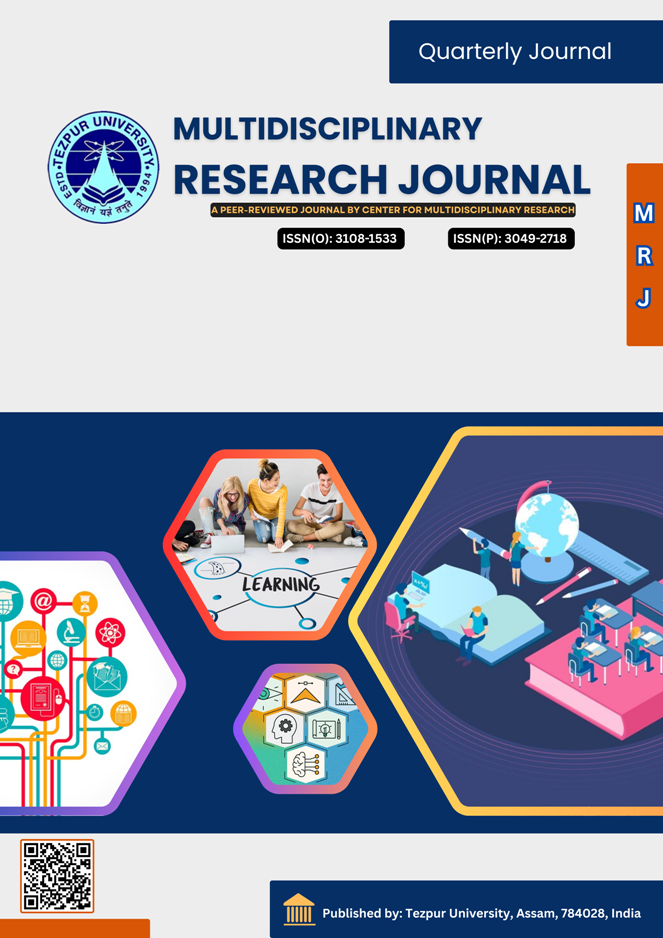Reclaiming Nature and Womanhood: An Ecofeminist Reading of Mitra Phukan’s The Collector’s Wife
DOI:
https://doi.org/10.63635/mrj.v1i2.26Keywords:
Literature, Ecofeminism, Environmental consciousness, Environmental degradation, PatriarchyAbstract
The paper explores Mitra Phukan’s (1953-) The Collector’s Wife (2005) through an ecofeminist lens, examining the interconnections between women's oppression and environmental degradation. It is set against the political unrest in Assam during the 1970s and 80s, and analyses how the novel intertwines the female character Rukmini’s internal conflict, infertility, and identity crisis with the exploitation of nature, reflecting broader themes of resilience and oppression. The paper employs Indian environmental activist and ecofeminist Vandana Shiva’s (1952-) ecofeminist theory, and highlights the spiritual and empowering link between women and the environment, positioning Rukmini’s journey as one of resilience and transformation. Additionally, the paper employs literary analysis alongside cultural ecofeminism and incorporates Samkhya philosophy’s prakrti- nature as a dynamic feminine principle symbolising regeneration and resistance to explore Rukmini’s transformative journey. Through her journey, the novel suggests that women’s resilience and nature’s regenerative power are deeply intertwined. By examining these intersections, the paper critiques the patriarchal structures that perpetuate parallel disempowerment of women and ecological oppression and advocates for the recognition of their shared strength and regenerative potential of women and nature, and emphasises the need for ecological harmony and gender equality.
Downloads
References
[1] Agarwal, B. The Gender and the Environment Debate. In Gender and Politics in India Menon N. Ed.; OUP: New Delhi, 1999; pp. 96-142.
[2] Gaard, G. Living Interconnections with Animals and Nature. In Ecofeminism: Women, Animals, Nature, Greta G., Ed.; Temple University Press: Philadelphia, 1993; pp. 1-2.
[3] Buckingham, S. Gender and Environment, Routledge: London, 2000
[4] King, Y. Endangering a Peaceful Planet: Ecology, Economy, and Ecofeminism in Contemporary Context. Rethinking Women’s Peace Studies1995, 23,15-21, https://www.jstor.org/stable/40003496.
[5] White, L. The Historical Roots of Our Ecologic Crisis. Science1967, 155, 1203–07, http://www.jstor.org/stable/1720120.
[6] Girin P. Ethnicisation of Politics in Northeast India, South Asian: New Delhi, 2003.
[7] Hussain, M. The Assam Movement: Class, Ideology and Identity, Manak Publications: India, 1993.
[8] Assam Movement: A Battle for Cultural Identity. Available online:https://testbook.com/ias-preparation/assam-movement, (Accessed on 18 April 2025).
[9] Baruah, S. India Against Itself: Assam and Politics of Nationality, Oxford University Press: New York, 2001.
[10] Talukdar, M. Secret Killings of Assam, NTF & HRLN: Guwahati, 2009.
[11] Phukan, M. The Collector’s Wife, Penguin: India, 2005.
[12] De Beauvoir, S. The Second Sex, Penguin: India, 2010.
[13] Genette, G. Narrative Discourse: An Essay in Method, Jane E. Lewin trans.; Cornell University, 1983.
[14] Oliver, T. The Self Delusion: The Surprising Science of How We Are Connected and Why That Matters, W&N: UK,2020.
[15] Carlassare, E. Socialist and Cultural Ecofeminism: Allies in Resistance. In Ethics and the Environment2000, 5, 89–106, http://www.jstor.org/stable/27766057.
[16] Mies, M.; Shiva V. Ecofeminism, Zed Books: India, 2014.
[17] Merchant, C. Ecofeminism and Feminist Theory. In Reweaving the World, I. Diamond, G. F. Orenstein, Eds.; Sierra Club Books: US, 1990, 100–105.
[18] Dally, M. The Mary Dally Reader. New York UP: US, 2017.
[19] Gaard, G. Living Interconnections between Women Animals and Nature. In Ecofeminism: Women, Animals and Nature, Greta Gaard, Ed., Temple UP: US, 1993, 1-14.
[[20] Larson, G J. Classical Samkhya: An Interpretation of its History and Meaning, Motilal Banarsidass: Delhi, 1969.
[21] Shiva, V. Staying Alive: Women, Ecology and Development, Women Unlimited: India, 2009.
[22] Warren, K. J. The Power and the Promise of Ecological Feminism. Environmental Ethics 1990, 12, 125-146,https://www.scribd.com/document/316741024/Karen-J-Warren-The-power-and-premise-of-Ecological-Feminism
[23] Merchant, C Radical Ecology: The Search for a Livable World, Routledge: UK, 2005.
[24] Christ, C P. Why Women Need the Goddess: Phenomenological, Psychological, and Political Reflections. Womanspirit Rising: A Feminist Reader in Religion, Harper & Row: New York, 1979.
[25] Thornber, K. L. Ecoambiguity: Environmental Crises and East Asian Literatures, Michigan UP: US, 2012, muse.jhu.edu/book/13594.
Downloads
 Abstract Display: 795
Abstract Display: 795  PDF Downloads: 468
PDF Downloads: 468 Published
Issue
Section
License

This work is licensed under a Creative Commons Attribution-NonCommercial 4.0 International License.
Copyright © Author(s) retain the copyright of this article.




